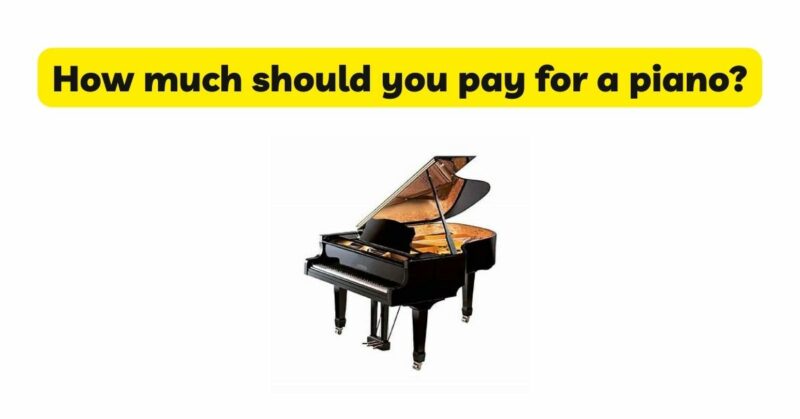When considering purchasing a piano, determining the appropriate amount to pay is a crucial decision. Pianos come in a wide range of prices, from budget-friendly options to high-end, luxurious instruments. The price you pay for a piano depends on various factors, including the type of piano, brand reputation, condition, age, and personal preferences. In this article, we will explore the considerations that can help you determine how much you should pay for a piano, ensuring that you make an informed and satisfactory purchase.
Factors Influencing the Price of Pianos:
- Type of Piano: Pianos come in various types, including upright pianos and grand pianos. Grand pianos, known for their superior sound and performance capabilities, tend to be more expensive than upright pianos. The size, construction, and complexity of a grand piano contribute to its higher price point. However, it’s important to note that upright pianos can still offer excellent musical experiences at more affordable prices, making them a viable option for many individuals.
- Brand Reputation: The reputation and prestige of the piano brand significantly influence its price. Established and well-regarded brands with a long history of craftsmanship, such as Steinway & Sons, Bösendorfer, or Yamaha, often command higher prices due to their quality, innovation, and legacy. These brands have built a reputation for producing instruments with exceptional sound, craftsmanship, and longevity. While the brand name can contribute to the price, it’s important to assess the instrument’s quality and condition alongside the reputation.
- Condition and Age: The condition and age of a piano are critical factors in determining its price. A brand-new piano, free from wear and tear, will generally have a higher price tag compared to a used piano. However, well-maintained and properly restored used pianos can offer excellent value at a lower cost. Factors such as regular maintenance, tuning history, and any necessary repairs or renovations can influence the price of a used piano. It’s advisable to have a piano technician assess the instrument’s condition before making a purchase.
- Size and Complexity: The size and complexity of a piano can also affect its price. Larger grand pianos with longer strings often produce richer and more resonant tones, but they also come with a higher cost due to the increased materials and craftsmanship involved. Similarly, intricate and advanced mechanisms within the piano, such as the action and hammers, can contribute to a higher price. Consider your space limitations, playing requirements, and budget when evaluating the size and complexity of the piano.
- Personal Preferences and Features: Personal preferences and desired features can also influence the price you should be willing to pay for a piano. For instance, if you prioritize digital capabilities, such as built-in recording features or connectivity options, the price will reflect those added functionalities. Likewise, specific design elements, finishes, or customized options can contribute to a higher price point. Determine which features are essential to your musical needs and assess their value accordingly.
Factors to Consider When Establishing Your Budget:
- Skill Level and Aspirations: Consider your skill level and long-term aspirations as a pianist. If you are a beginner or casual player exploring the instrument, a more affordable piano may be suitable. As you progress and develop your technique, you may find it necessary to invest in a higher-quality instrument that can support your growth and musical goals. Professional pianists and serious enthusiasts who perform or teach at an advanced level may need to allocate a higher budget to acquire a piano that meets their exacting standards.
- Available Financial Resources: Your available financial resources will naturally play a significant role in determining your piano budget. Establish a realistic budget that aligns with your overall financial situation and priorities. It’s important to strike a balance between investing in a quality instrument and managing your financial responsibilities. Remember that while a higher budget can potentially provide access to superior instruments, there are excellent options available at various price points.
- Long-Term Value and Investment: Consider the long-term value and potential investment aspects of a piano. Higher-quality pianos from reputable brands are more likely to retain their value or appreciate over time. They often offer greater durability, tonal excellence, and an overall superior playing experience. If you anticipate the possibility of upgrading or reselling the piano in the future, investing in a well-regarded instrument can be a prudent choice.
- Available Alternatives: Explore alternative options when determining your piano budget. For instance, instead of purchasing a brand-new piano, you may consider used pianos from reputable dealers or individuals who have properly maintained them. These used instruments can offer excellent value for money, providing access to higher-quality pianos at more affordable prices. Additionally, rental programs or leasing options allow you to experience a quality instrument without the upfront cost of purchasing.
- Seek Expert Advice: Consulting with piano technicians, music educators, or experienced pianists can provide valuable insights into the price range suitable for your needs. These professionals can evaluate the quality, condition, and value of a piano, helping you make an informed decision based on your preferences, playing requirements, and budget.
Conclusion:
Determining how much you should pay for a piano requires careful consideration of several factors, including the type of piano, brand reputation, condition, age, personal preferences, and available financial resources. By assessing your skill level, long-term aspirations, and evaluating the market landscape, you can establish a reasonable budget that balances quality and affordability. Remember that the ultimate goal is to find a piano that inspires and supports your musical journey, regardless of the price tag.


